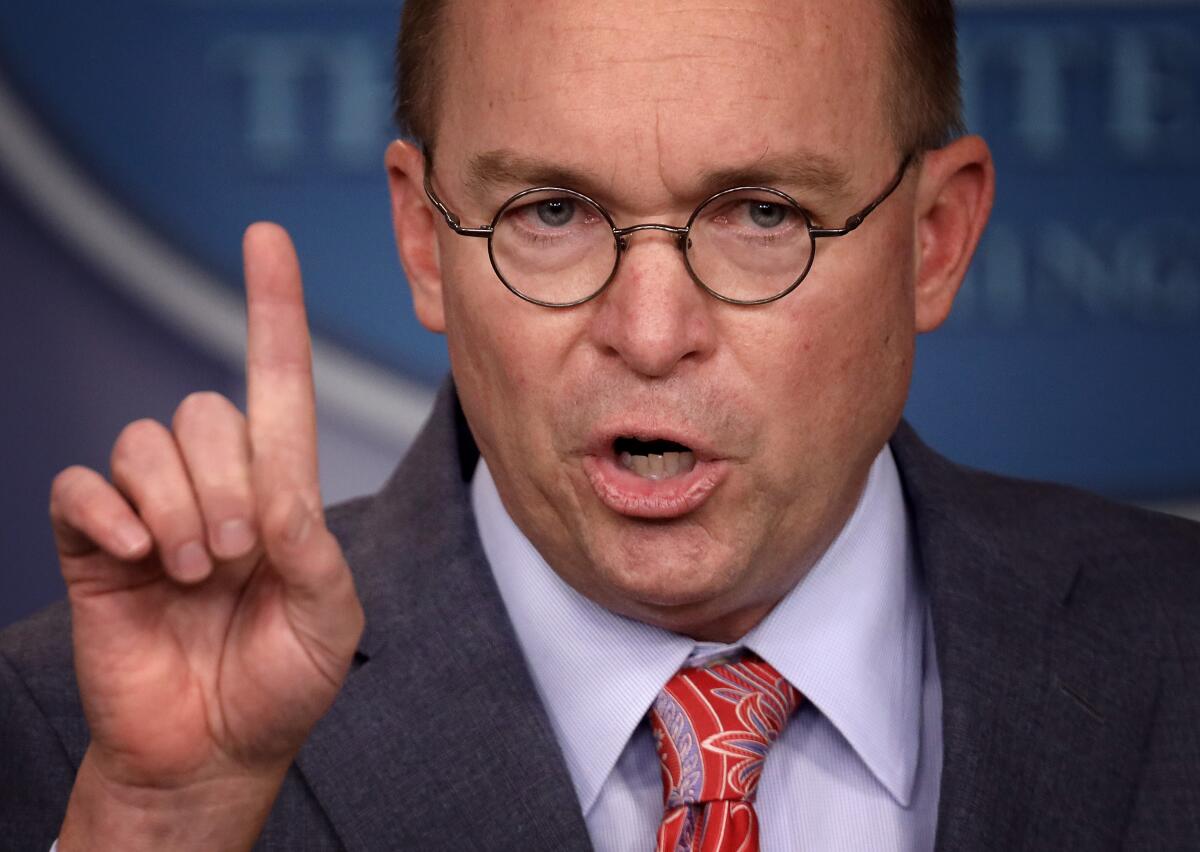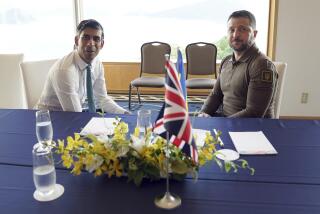Trump’s reversal on hosting G-7 summit at his resort comes amid bigger battles on Syria and impeachment

- Share via
WASHINGTON — President Trump’s reversal on hosting a major international meeting at one of his own resorts was a rare retreat for the famously stubborn man, who was taken aback by a bipartisan barrage of criticism for a proposal that smacked of self-dealing.
Trump announced late Saturday he was abandoning plans to host the Group of 7 summit at his Doral resort near Miami in June, and on Sunday acting White House Chief of Staff Mick Mulvaney said in a television interview that Trump “was honestly surprised at the level of push back.”
“At the end of the day, he still considers himself to be in the hospitality business, and he saw an opportunity to take the biggest leaders from around the world and he wanted to put on the absolute best show,” Mulvaney said on Fox News Sunday. “He’s in the hotel business, or at least he was before he was president.”
The turnaround, which Trump announced on Twitter, came just two days after the G-7 site had been announced to a chorus of complaints that the president stood to benefit financially from hosting the large international conference. Trump said Saturday he was backing down because of criticism from Democrats and the media, but many Republicans were also openly critical.
The firestorm is a self-inflicted political wound for Trump at a time when the White House is battling on a dizzying array of other, more consequential, fronts.
Trump has faced unprecedented GOP opposition to his decision to withdraw U.S. troops from northern Syria, including blunt criticism from the usually loyal Senate Majority Leader Mitch McConnell of Kentucky and a stampede of Republicans supporting a House resolution denouncing his Syrian policy.
All this comes at a time when Trump needs Republicans to stick with him as the House impeachment inquiry is rattling his presidency and shadowing his bid for reelection in 2020.
The burgeoning inquiry is probing allegations that the president abused the power of his office by withholding U.S. aid to Ukraine while demanding that the country investigate his domestic political adversaries.
Michael Steel, a former aide to House GOP leaders, said it was a singularly bad time to ask Republicans to defend an “indefensible” decision to hold the G-7 at one of Trump’s for-profit properties.
“It was one more front he couldn’t fight on when he was already fighting on Syria and Ukraine,” said Steel, on CBS’ “Face the Nation.”
Some Trump critics argued that the controversies surrounding the G-7 and Ukraine were linked.
“The Doral reversal and Ukraine scandal both revolve around the same issue: the president abusing his power for self-interest,” said Julian Zelizer, a Princeton historian, on Twitter. “This is at the heart of the impeachment inquiry.”
In his Fox interview Sunday, Mulvaney again insisted there was no quid pro quo in Trump’s dealings with Ukraine.
That contradicted what Mulvaney said at a news briefing last Thursday, when he openly confirmed that the administration’s decision to delay congressionally approved aid to Ukraine was linked to Trump’s demand for the country to investigate what, if any, role that country played in the 2016 U.S. election, despite a lack of evidence.
When a reporter asked if that amounted to a quid pro quo, Mulvaney responded, “We do that all the time.”
Hours after the briefing, Mulvaney tried to reverse his statement. He again argued Sunday that he was misunderstood, and that Trump’s request for a Ukrainian investigation was not connected to aid.
“That’s what people are saying that I said, but I didn’t say that,” Mulvaney said. “Can I see why people took that the wrong way? Absolutely.”
In announcing his reversal on the location of the G-7 summit, Trump said the administration would look for a new site, including possibly the presidential retreat at Camp David.
Mulvaney said he had talked to the president “at great length” about the controversy Saturday night.
“I think we were all surprised at the level of push back,” he said. “I think it’s the right decision to change and we’ll have to find someplace else, and my guess is we’ll find someplace else the media won’t like for another reason.”
More to Read
Get the L.A. Times Politics newsletter
Deeply reported insights into legislation, politics and policy from Sacramento, Washington and beyond. In your inbox three times per week.
You may occasionally receive promotional content from the Los Angeles Times.











